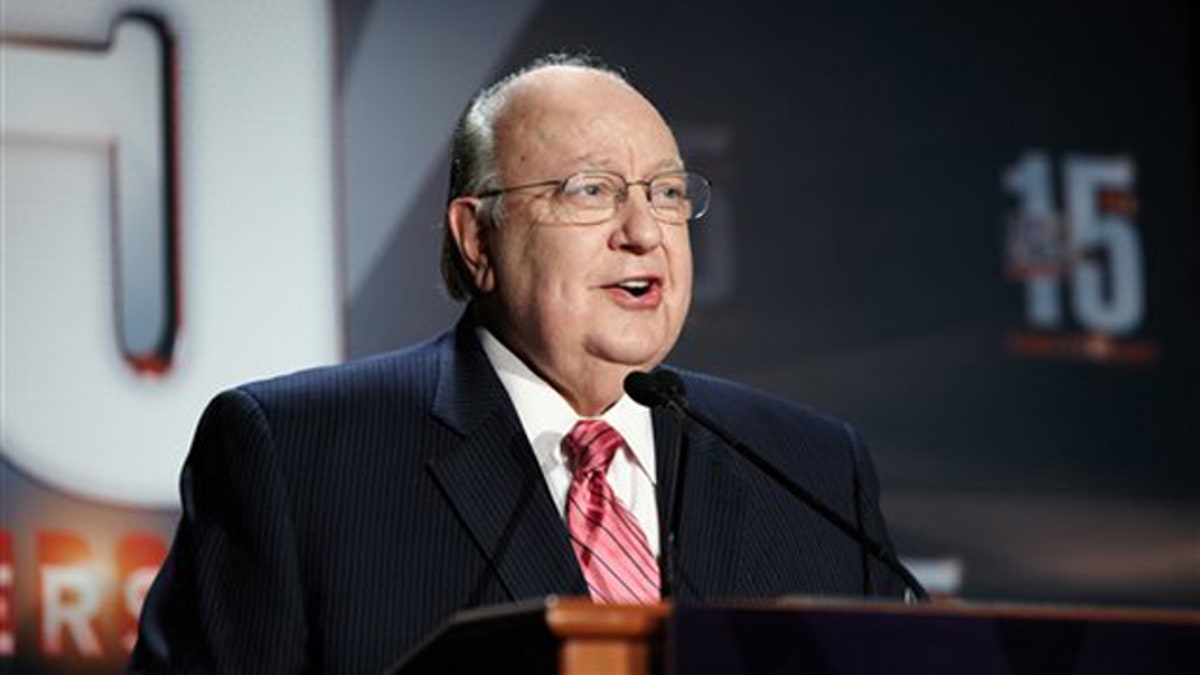
In this Sept. 2011 photo released by 2MK Studio/Fox News, Fox News chairman-CEO Roger Ailes speaks at a 15-year anniversary party held for employees at Chelsea Piers in New York. (AP)
As the most powerful man in the universe, or one of them anyway, Roger Ailes can look back on the first 15 years of his crowning achievement, Fox News Channel, with satisfaction. And he does.
It was way back in February 1996 that, at the behest of News Corp. chieftain Rupert Murdoch, Ailes began creating from scratch an all-news network to challenge the venerable CNN as well as upstart MSNBC, which was set to launch that July.
"It was a risky move," Ailes recalls, and not just for News Corp., whose $900 million or so would bankroll the venture. Fox News Channel was also risky for Ailes himself, who, then 55, was a communications guru of legendary savvy -- a former Republican media strategist, TV producer and, until his abrupt resignation in January 1996, the head of CNBC and creator of another cable network, America's Talking, that was being sacrificed to free up room for MSNBC.
"I realized at my age that if I screwed up, or it didn't work, I'd probably never work again," says Ailes. "You just don't go out when you're over 55 years of age, have a colossal failure and expect to find work in your field again.
"That was on my mind," he confides, then pauses half-a-beat. "For a half-hour. Then I said, `I'll make it work."'
He made it work. Fifteen years ago this Friday -- on Oct. 7, 1996 -- Fox News Channel signed on, as scheduled.
And little more than five years later, it eclipsed that epic initial feat with another, by topping rival CNN in viewership for a full month.
Allowing himself to gloat for a moment, Ailes savors the ill-advised prediction from a top executive at CNN parent Turner Broadcasting Co. who in May 2001 was quoted saying that, within a year, CNN's new management team would vault CNN "well ahead of Fox."
Since 2002, Fox News has sealed the deal as ratings leader, dominating cable-news competition (and tying them in knots) in daytime, as well as in prime time with a murderers' row of hosts led by Bill O'Reilly and Sean Hannity. The past year, Fox News Channel drew an average 1.1 million viewers -- more than CNN and MSNBC combined.
Propelled by Ailes' "fair and balanced" branding, it successfully has targeted viewers who believe the other cable-news networks, and maybe the media overall, display a liberal tilt from which Fox News delivers them with unvarnished truth. Preaching its fairer-than-thou gospel, Fox News leveraged the public's distrust for the media while positioning itself as the anti-media news-media alternative.
Or so it seems to Fox News' detractors, who lodge nonstop salvos against a network they decry as a conservative soap box writ large, even a mouthpiece for the Republican Party shaping public opinion on its behalf. These critics came to include Media Matters, a nonprofit group that polices Fox News as part of its larger stated mission to "correct conservative misinformation in the U.S. media," and filmmaker Robert Greenwald, who in 2004 released the scathing documentary "Outfoxed: Rupert Murdoch's War on Journalism."
From the start, Ailes has steadfastly denied any such political bias or agenda on the part of his network. Politics, schmolitics: "I hired Sarah Palin because she was hot and got ratings," he declares.
From the get-go, he meant for his network to counteract the sins he saw others committing: "I really believed there was no fairness or balance" elsewhere on the journalism landscape.
And they struck back.
"Everybody who's getting their ass beat vilifies the opponent," he says, speaking of the networks Fox News is beating handily. "This is the first rule of fighting."
Ah, the fight! Ever since a 27-year-old Ailes counseled Richard Nixon on how to use TV to win the presidency, such terms as "combative" and "ferocious" have described Ailes' two-fisted style. But during a recent conversation, Ailes, now 71, seems not as pugnacious as he surveys Fox News Channel's history and his place in it. "Mellow" wouldn't be the word for this chairman-CEO, but as he talks he seems more reflective than feisty.
"I don't rise to the occasion when there's no occasion," he replies when asked what the passing years have taught him.
Ailes has eased his heavyset frame into a wing chair in his office at News Corp.'s mid-Manhattan headquarters, where he graciously receives a guest who likely represents one of his least favorite characters: a journalist who doesn't work for him.
"When there IS an occasion," he goes on, "I will do what I have to do, and I will win. Is that mellowing? I tend to see it more as picking my battles a little better than I used to. That's probably the best thing I've learned: to save it for when you need it, because when you need it, you have to win."
But why, specifically, has Fox News Channel won against its rivals for a decade?
"The consistency of our product," Ailes sums up matter-of-factly. "I think we do better television than the other guys, and no matter how we do it, they don't seem to catch up. We seem to out-invent them and think ahead of them, and have better story ideas, better graphics, better on-air talent. We just are better television producers."
At Fox, there's also a consistency in leadership -- consistency in Ailes' laser-focused vision for the network -- that other networks can't come close to matching. From them, "there have been 14 or 15 senior executives thrown at me," Ailes says. "So part of their problem is, the corporations lost confidence in their own senior executives. I think that helped me some. I think their screw-ups may have been corporate in nature, in the sense that if they had great executives in there, they didn't back `em. And some of them WEREN'T great executives."
While he allows that, in the beginning, he "underestimated a little bit" how hard it would be to seize the ratings mantle from his rivals, "I had not counted on them screwing up as much," he hastily adds.
Ailes, who calls himself "a television producer by trade" and understands TV in his bones as well as anyone alive, points to CNN's "The Situation Room With Wolf Blitzer" as an example of how the competition falls short.
"Wolf Blitzer is an excellent reporter, but he's not a star," says Ailes. And since the format of the show calls for Blitzer to highlight visuals on the "news wall" behind him, "he spends half of his time with his back to the camera. I like Wolf. I think he's a good journalist. But
I get offended that his back is to the camera." (CNN declined to respond.)
It is this level of detail at which Ailes scrutinizes what goes on the air, from his rivals and, especially -- exhaustively -- on his own channels, which also include the 4-year-old Fox Business Network.
Ailes' empire has further expanded to include Fox News Radio, Fox News' digital platform, the Fox Television Stations Group and Twentieth Television syndication group since he flipped the switch on Fox News Channel's first day.
"If you'd asked me that day would I still be here in 15 years, I probably would have said no," he muses, noting that his career had previously taken the form of serial troubleshooting: "People would call me and give me a really ugly problem to solve, and I would do it, and then I'd ride out of town like the Lone Ranger and go on to the next thing.
"But the business channel, radio and dot-com world came along, and the competition of fighting NBC and CNN was exhilarating. So here I am."
One problem he insists he won't be facing is the hacking scandal that has engulfed other areas of Murdoch's News Corp. empire in London.
"We don't have a problem," Ailes says flatly. It's apples-and-oranges -- British tabloid culture gone terribly wrong, as opposed to a U.S. television operation whose "editorial is terrific."
"I've stayed away from this News Corp. issue because it's not a Fox News issue," he says. "I know nothing more about it than I'm reading in the press, and I don't discuss it with Rupert."
Ailes' contract runs out in Summer 2013, after one more rollicking presidential race, and shortly after he turns 73. He says he hasn't decided if he'll stay on, or, if not, what's next.
"The bad news," Ailes cracks, "is, I just went to my doctor and he said, `Other than arthritis, your chart reads like a 40-year-old's. You're old, you're fat and you're ugly, but you're not going to die from any of those things immediately.' So if I still feel like this and somebody offers me a job in June of `13, I may just take it."
Maybe he'll take on this challenge back in his native Ohio: the Cleveland Indians. They won the World Series in 1948, and haven't since.
"I always wanted to raise the money to go back and buy the Cleveland Indians and be sure they won one more World Series," Ailes says. "But I got sidetracked."
Then, chuckling, he cites his status as a favorite lightning rod for liberals' disdain.
"The politically correct crowd would go after me to change the team's name," he says, maybe joking and maybe not. "They'd be all over my ass because I bought the Indians!"









































